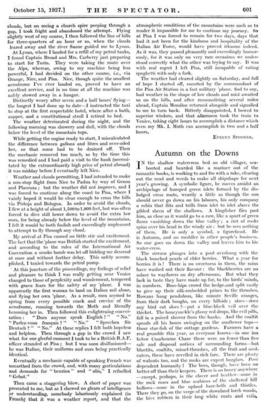Autumn on the Downs I Nthe shallow watercress bed an old
villager, sea- booted and bearded like a mariner out of the romantic books, is working to and fro with a rake, clearing out the mud and weeds to make all shipshape for next year's growing. A symbolic figure, he moves amidst an archipelago of humped green islets formed by the dis- lodged cress roots, wearily a little as though the sun should never go down on his labours, his only company a robin that flits and trills from islet to islet above the gilded sheen of the shallows. A kingfisher flies past him, as close as it would go to a cow, like a spurt of green flame vanishing down the blue valley ; a riot of rooks spins over his head in the windy air : but he sees nothing of them. He is only a symbol, a figurehead. He is Autumn, and no meddler in other people's business. So one goes on down the valley and leaves him to his water-cress.
The stream plunges into a pool overhung with the black bunched pearls of elder berries. What a year for berries it is ! There is no sweetness in them, the rains have washed out their flavour : the blackberries arc no solace to wayfarers on dry afternoons. But what they lack in taste they have made up for, to the birds' minds, in numbers. Rose-hips crowd the hedge.and split easily to give up their silk-embedded prizes to the thrushes. Rowans hang pendulous, like minute Seville oranges, from their dark boughs, on every hillside ; sloes—does any bird eat sloes ?—put a blue-black veil over the thicket. The honeysuckle's glassy red drops, like evil pills, fall in a poised shower from the banks. And the coaltit spends all his hours swinging on the sunflower tops— those star-fish of the cottage gardens. Farmers have a real grumble this year, as everyone knows—in one inn below Cranbourne Chase there were no fewer than five sale and disposal notices of surrounding farms—but bluetits, coaltits, missel-thrushes, all the fruit and seed- eaters, these have revelled in rich fare. There are plenty of walnuts too, and the rooks are expert burglars. Poor dependent humanity I The bees, though, have been no better off than their keepers. There is no honey anywhere —except, perhaps, in the clover and heather—none in the rock roses and blue scabious of the sheltered hill hollows—none in the upland hare-bells and thistles. There they go, on the verge of the downland larch woods, the hive robbers in their long white coats and veils, but the combs arc empty : no sunlight, no nectar in the petalled cup.
Yet sweetness has come to the land at last : and now " happy " is the only word for those autumn fields lying below there to the north and west. We have brought the sun up with us out of the South Country—and fruitful- ness : here are apples, apples all the way—a very mellow and soft light drenching the quiet world. The silence is audible, and rare, it is charged with history. Stand on Loughborough Hill, that high place where King Alfred stood, and you have all round you the most stirring views in England. There is Oxford, in the blue distance. There is the edge of the Chilterns, jutting out like a headland into what was once, perhaps, a tongue of the sea. Nohody knows : down there, at any rate, the water is brackish, and there are pearly shells, nautilus shells, winding necklace-shells in the sandy soil. The ploughman turns them over, and they sing him old songs, maybe, of ships and many cargoes ; a long time ago.' You lift your gaze, and there is the Icknield Way ; that great pilgrim-road that the Iberians made before the upstart Caesar came into their country, with his grasping nature and his straight, unimaginative roads : it is now only a grassy track, that highway on the swollen hill's side, a gallop for race-horses, up and down in the October dawn-light. The ground underfoot is soaked in Danish blood—in the spring the Masque lilies will tell you that. And yonder, below their stone effigies in the little church among yews, lie the Crusaders, the de la Beche nobles with their henchmen, buried in their own bright ground. John Long, John Strong, John Ever-Afraid : there they lie forever.
Sheep-bells tinkle, low, deep, watery notes from some hidden pasture-land. A thin blue wisp of smoke rises up out of Blewbury, below the downs, up out of the fall- touched trees, faintly and slowly curling. What logs are those, apple-logs ? And what is cooking there ? We will go 'down, through the woods where beech-leaves fall in a gold shower, thick, as snowflakes.
HAMISH MACLAREN.



















































 Previous page
Previous page